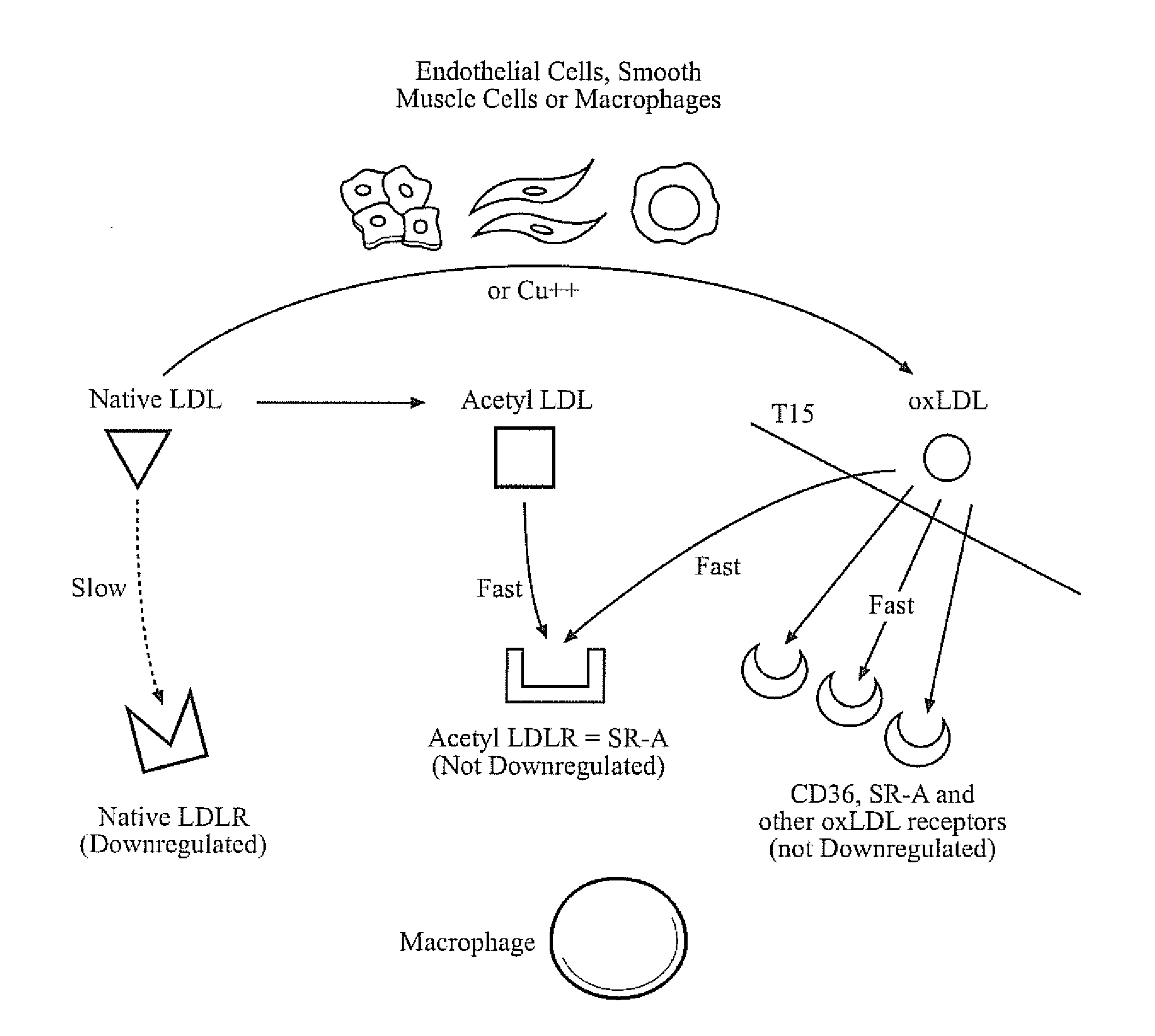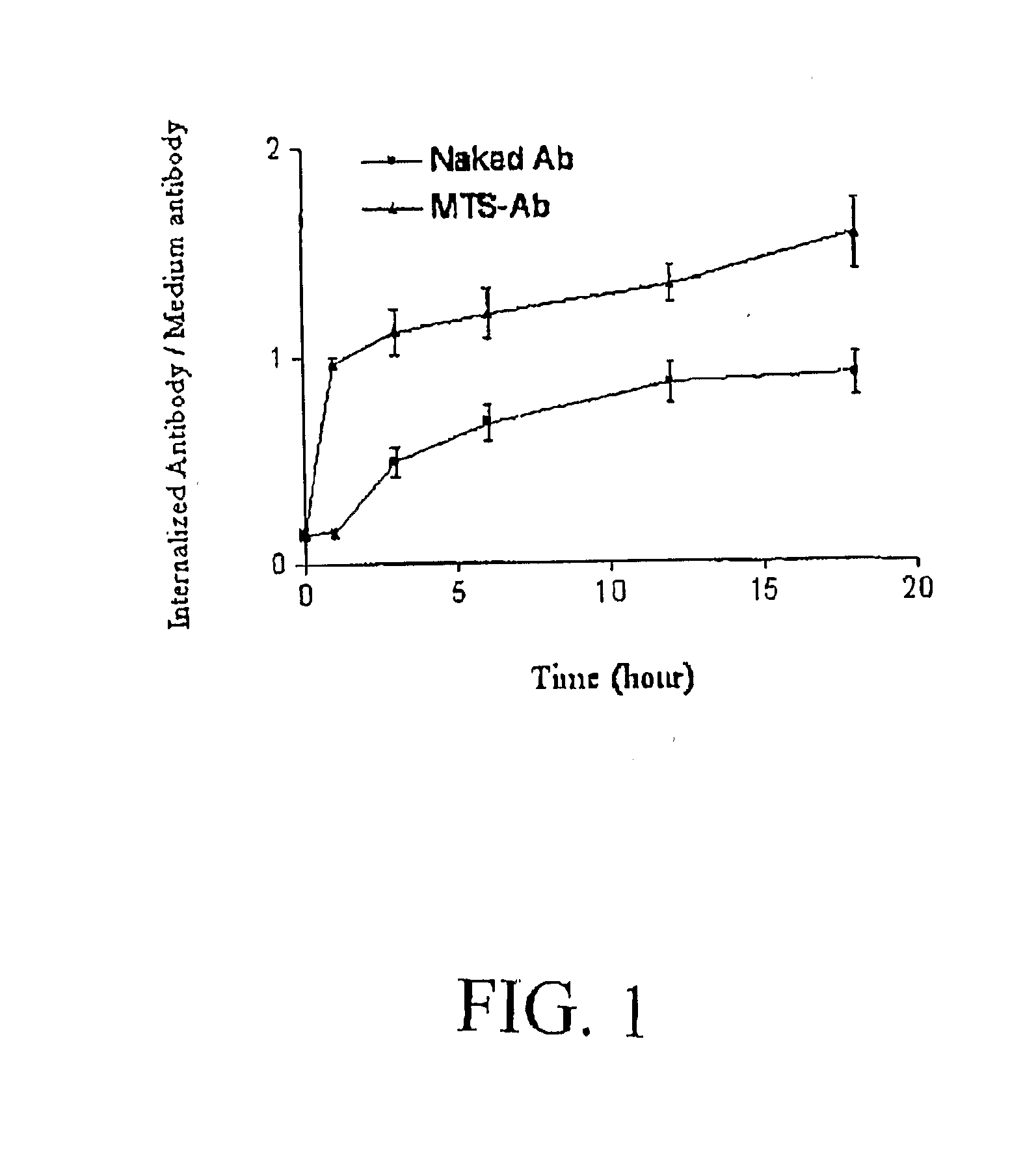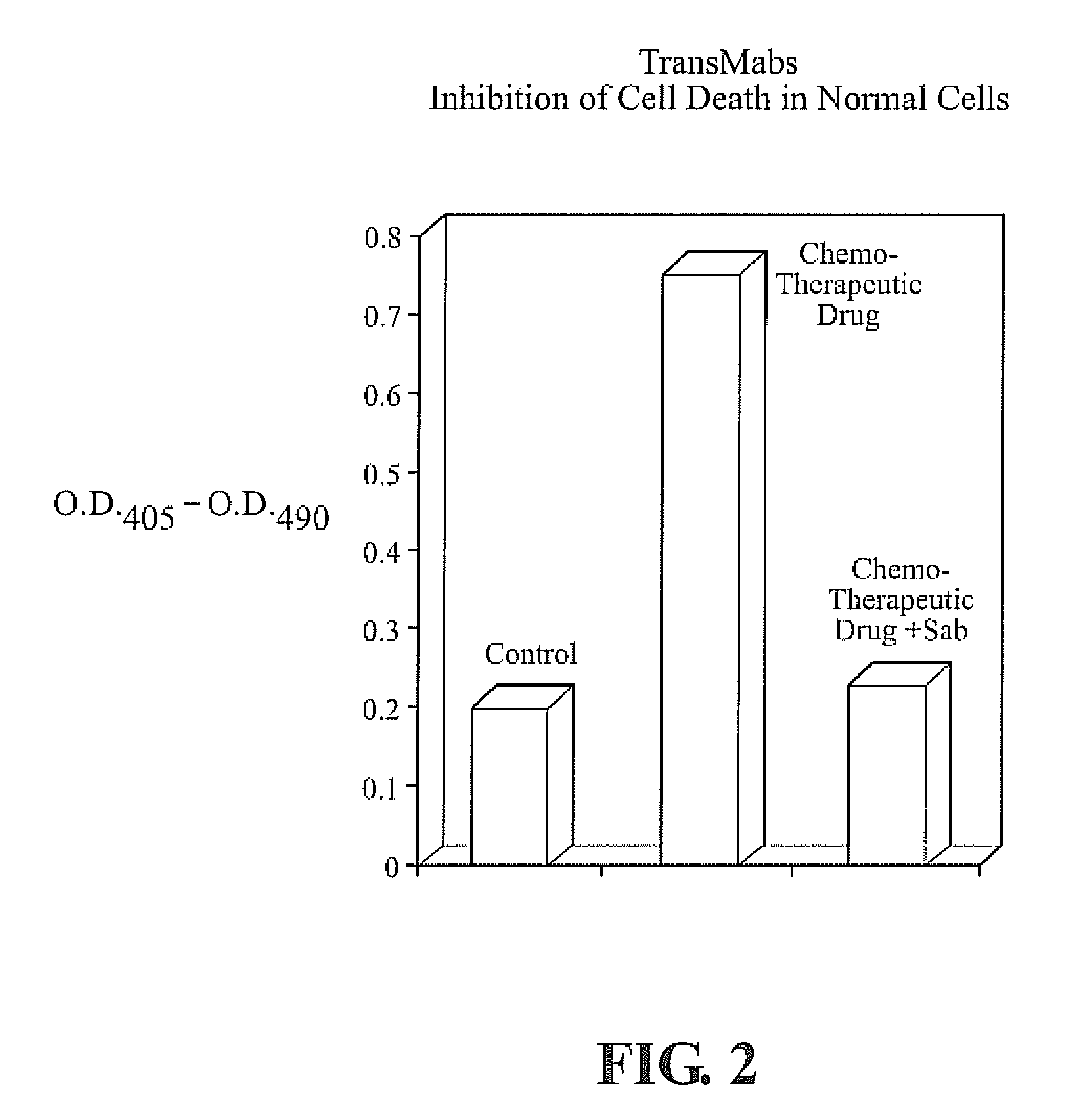Superantibody synthesis and use in detection, prevention and treatment of disease
a technology of superantibodies and antibodies, applied in the field of antibodies, can solve the problems of insufficiently locating or killing the target in either their native or native state, and the antibody that exhibits desired specificity in laboratory studies often fails in pre-clinical and clinical evaluations, and achieves the effect of facilitating the translocation of antibodies
- Summary
- Abstract
- Description
- Claims
- Application Information
AI Technical Summary
Benefits of technology
Problems solved by technology
Method used
Image
Examples
example 1
Conjugation of T15 Peptide to Two Mabs Specific for B-Cell Receptor
[0076]Cell Line and Antibodies.
[0077]The human B-cell tumor line (Su-DHL4) and murine B-cell tumor line (38Cl 3) are grown in RPMI 1640 medium (supplemented with 10% fetal bovine serum, 2 μmol / L glutamine, 10 μmol / L HEPES, 50 LVmL penicillin, and 50 μg / mL streptomycin, 50 μmol / L 2-mercaptoethanol) at 37° C. under 5% carbon dioxide. Two mAbs, 5D10 and S1C5, specific for the human or murine BCR, respectively, were used in this study. The antibodies are purified from the culture supernatant by protein G and protein A affinity chromatography.
[0078]Synthesis of Antibody-Peptide Conjugate.
[0079]T15H peptide ASRNKANDYTTDYSASVKGRFIVSR (SEQ ID NO. 1), a VH-derived peptide from an autophilic antibody-Tl 5, was synthesized by Genemed Synthesis (San Francisco, Calif., U.S.A.). Antibodies were dialyzed against PBS (pH 6.0) and 1 / 10 volume of 200 μmol / L sodium periodate was added and incubated at 4° C. for 30 minutes in the dark. ...
example 2
Internalization of Antibodies Conjugated with MTS Peptide
[0110]Cell Line and Antibodies
[0111]Human Jurkat T cells were grown in RPMI 1640 supplemented with 10% fetal bovine serum and antibiotic (penicillin, streptomycin and amphotericin). Rabbit polyclonal anti-active caspase-3 antibody (#966 IS) and anti cleaved-fodrin, i.e., alpha II spectrins (#2121 S), were purchased from Cell Signaling, Inc (Beverly, Mass.). Monoclonal (rabbit) anti-active caspase-3 antibody (#C92-605) was purchased from BD PharMingen (San Diego, Calif.). Mouse monoclonal antibody 3HI (anti-CEA) was purified from cell-culture supernatant by protein G affinity chromatography. Anti-mouse and anti-rabbit HRP-conjugated secondary antibodies were purchased from Santa Cruz Biotechnologies, Inc. ApoAlert Caspase-3 Fluorescent Assay kit was purchased from Clontech Laboratories (Palo Alto, Calif.). The Cell Death Detection ELISA was purchased from Roche Applied Science (Indianapolis, Ind.).
[0112]Synthesis of MTS Peptide...
example 3
Enhancing Binding and Apoptosis using Peptide-Conjugated Anti-CD20 Antibodies
[0130]Cell Line and Antibodies
[0131]The human B-cell tumor lines SU-DHL-4 and Raj were grown in RPMI 1640 medium, supplemented with 10% fetal bovine serum, 2 mmol / L glutamine, 10 μmol / L Hepes, 50 U / mL penicillin, 50 μg / mL streptomycin, and 50 μmol / L 2-mercaptoethanol at 37° C. under 5% carbon dioxide. Mouse monoclonal antibodies 1F5 IgG2a (ATTC #HB-9645) specific for human B-cell lymphomas 5D10 and 3H1 (Zhao, Lou, et al., 2002.) were purified from cell culture supernatant by protein G or protein A affinity chromatography.
[0132]Synthesis of Antibody-Peptide Conjugate
[0133]T15 peptide ASRNKANDYTTDYSASVKGRFIVSR (SEQ ID NO. 1), a VH-derived peptide from a self-binding antibody-T15, was synthesized as described in Example 1. 8-azido-adenosine-biotin was synthesized and used to affinity cross-link biotin to antibodies. The 8-azidoadenosine dialdehyde was prepared as previously described (U.S. Pat. No. 5,800,991, ...
PUM
| Property | Measurement | Unit |
|---|---|---|
| concentration | aaaaa | aaaaa |
| pH | aaaaa | aaaaa |
| pH | aaaaa | aaaaa |
Abstract
Description
Claims
Application Information
 Login to View More
Login to View More - R&D
- Intellectual Property
- Life Sciences
- Materials
- Tech Scout
- Unparalleled Data Quality
- Higher Quality Content
- 60% Fewer Hallucinations
Browse by: Latest US Patents, China's latest patents, Technical Efficacy Thesaurus, Application Domain, Technology Topic, Popular Technical Reports.
© 2025 PatSnap. All rights reserved.Legal|Privacy policy|Modern Slavery Act Transparency Statement|Sitemap|About US| Contact US: help@patsnap.com



